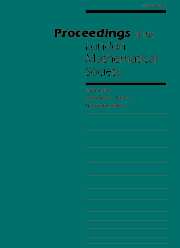Article contents
ALMOST EVERYWHERE CONVERGENCE OF BOCHNER–RIESZ MEANS ON THE HEISENBERG GROUP AND FRACTIONAL INTEGRATION ON THE DUAL
Published online by Cambridge University Press: 09 July 2002
Abstract
Let $L$ denote the sub-Laplacian on the Heisenberg group $\mathbb{H}_n$ and $T_r^\lambda := (1 - r L)^\lambda_+$ the corresponding Bochner-Riesz operator. Let $Q$ denote the homogeneous dimension and $D$ the Euclidean dimension of $\mathbb{H}_n$. We prove convergence a.e. of the Bochner-Riesz means $T_r^\lambda f$ as $r \rightarrow 0$ for $\lambda > 0$ and for all $f \in L^p(\mathbb{H}_n)$, provided that \frac{Q-1}{Q} \Big(\frac{1}{2} - \frac{\lambda}{D-1} \Big) < 1/p \le 1/2. Our proof is based on explicit formulas for the operators $\partial_{\omega^a}$ with $a \in \mathbb{C}$, defined on the dual of $\mathbb{H}_n$ by $\partial_{\omega^a} \widehat{f} := \widehat{\omega^a f}$, which may be of independent interest. Here $\omega$ is given by $\omega(z,u) := |z|^2 - 4iu$ for all $(z,u) \in \mathbb{H}_n$.
2000 Mathematical Subject Classification: 22E30, 43A80.
- Type
- Research Article
- Information
- Copyright
- 2002 London Mathematical Society
- 2
- Cited by


